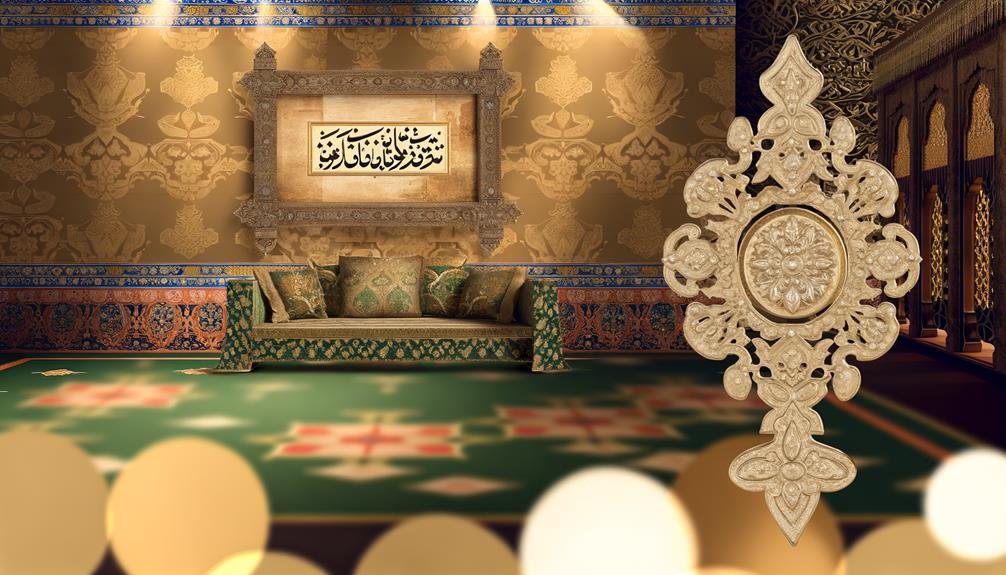Khadija Name Meaning in Urdu
In Urdu, the name Khadija (خدیجہ) holds deep historical and spiritual significance. It means 'premature' or 'born before the due time.' Named after Khadija bint Khuwaylid, the first wife of Prophet Muhammad, it symbolizes wisdom, strength, and unwavering faith.
Khadija was a prominent businesswoman whose support was crucial in the early years of Islam. Naming someone Khadija invokes her legacy of resilience and piety.
The name transcends cultural boundaries, commonly used across Middle Eastern, African, and South Asian communities. Discovering more about this name unfolds a rich tapestry of historical and spiritual value.

Key Takeaways
- Khadija نام کا مطلب ہے 'قبل از وقت پیدا ہونے والی'۔
- اس نام کی جڑیں عربی زبان میں ہیں۔
- Khadija کا نام اسلامی تاریخ میں محترم اور قابل تعظیم ہے۔
- Khadija نام مضبوطی، حکمت اور عقیدت کی علامت ہے۔
- Khadija نام نیک نیتی، استقامت، اور ایمان کی نمائندگی کرتا ہے۔
Historical Background
Rooted in early Islamic history, the name Khadija holds significant reverence due to its association with Khadija bint Khuwaylid, the first wife of the Prophet Muhammad.
You'll find that Khadija wasn't just a devoted spouse but also a prominent businesswoman in her own right. Her unwavering support and belief in Muhammad's prophethood played an essential role during the formative years of Islam. By understanding her exceptional character and contributions, you appreciate why the name Khadija is held in such high esteem.
Her legacy of faith, resilience, and generosity continues to inspire many. This historical backdrop enriches the name's meaning, providing a profound sense of connection to Islamic heritage and values.
Linguistic Origins
Delving into its linguistic origins, the name Khadija is derived from the Arabic verb 'khadija,' which means 'premature' or 'born before the due time.' This naming convention reflects a deep cultural appreciation for the nuances of birth and timing.
When you consider the etymology, it’s clear that Khadija holds a unique place in Arabic nomenclature. The name’s structure, with its delicate yet powerful phonetic composition, embodies the rich linguistic heritage of the Arabic language. In addition to its linguistic significance, the name Khadija also holds deep cultural and historical importance in Arabic tradition. Its historical roots can be traced back to the beloved wife of the Prophet Muhammad, who played a pivotal role in the early days of Islam. The meaning of Hassan name, on the other hand, is associated with beauty, goodness, and virtue in Arabic culture, further highlighting the nuanced and meaningful nature of Arabic nomenclature.
Spiritual Significance
The name Khadija holds profound spiritual significance, particularly within Islamic tradition, as it's closely associated with Khadija bint Khuwaylid, the revered first wife of the Prophet Muhammad.
Khadija's unparalleled faith, unwavering support, and remarkable wisdom exemplify the highest spiritual virtues in Islam. Her unwavering belief in the Prophet's mission provided foundational strength during the nascent stages of Islam.
As a successful businesswoman and a pious individual, Khadija's life demonstrates the harmonious balance between material success and spiritual devotion.
When you name someone Khadija, you invoke a legacy of piety, resilience, and unwavering faith. This name serves as a constant reminder of the profound spiritual virtues she embodied, offering inspiration for those who bear it.
Cultural Context
In various cultures, the name Khadija carries significant historical and social importance, often symbolizing a legacy of strength, wisdom, and dedication.
You'll find that in many Muslim communities, naming a child Khadija is a way to honor the first wife of the Prophet Muhammad, who was renowned for her business acumen and unwavering support.
The name transcends geographical boundaries, commonly found in Middle Eastern, African, and South Asian societies.
Its rich historical context evokes respect and admiration, emphasizing qualities that parents hope their children will embody.
Understanding the cultural context of the name Khadija allows you to appreciate its profound impact and the enduring values it represents within various traditions and communities.
Famous Namesakes
When considering famous namesakes of Khadija, you can't overlook Khadija bint Khuwaylid, the first wife of the Prophet Muhammad, whose legacy shapes Islamic history in a meaningful way.
Her business acumen and unwavering support for the Prophet exemplify the powerful cultural impact the name Khadija holds.
Additionally, contemporary figures bearing the name continue to inspire and lead, reflecting the enduring respect and honor associated with it.
Historical Figures Named Khadija
Numerous historical figures named Khadija have left indelible marks on various fields, showcasing the name's enduring legacy and influence.
Khadija bint Khuwaylid, the first wife of the Prophet Muhammad, stands as an iconic figure in Islamic history. Her wisdom, business acumen, and unwavering support played a pivotal role in early Islam.
Another notable Khadija is Khadija Gayibova, an Azerbaijani pianist and composer, who contributed significantly to the cultural landscape in the early 20th century.
These women, among others, illustrate the multifaceted legacy associated with the name Khadija. By exploring their lives, you gain insight into the profound impact they had on their respective societies, further enriching your understanding of the name's historical significance.
Cultural Impact of Khadija
Building upon the historical significance of these figures, the name Khadija continues to resonate in contemporary culture through numerous famous namesakes who embody its rich heritage and values.
You'll find Khadija celebrated in various fields, from academia to the arts. For instance, Khadija Ismayilova, an Azerbaijani investigative journalist, exemplifies courage and resilience. Similarly, Khadija Gbla, a Sierra Leonean-Australian activist, advocates for women's rights and cultural awareness.
These modern bearers of the name Khadija reflect the pioneering spirit and strength associated with the name. Such individuals not only honor the legacy of Khadija bint Khuwaylid but also inspire new generations to embrace these timeless qualities. Their contributions reinforce the enduring cultural impact of the name Khadija.
Variations and Spellings
Exploring the variations and spellings of the name Khadija reveals its rich linguistic heritage and cultural significance. You'll find that different cultures and languages have adapted the name, reflecting its broad influence and timeless appeal.
- Khadijah: This spelling maintains fidelity to the original Arabic pronunciation.
- Khadiga: Commonly used in Egypt, this variation highlights regional linguistic nuances.
- Hatice: In Turkish, this form shows the phonetic adaptation to the Turkish language.
- Khadija: The standard spelling in many English-speaking contexts, preserving the essence of its origin.
Each variation and spelling not only honors the original name's meaning but also showcases the diverse ways in which it's embraced across the world. Understanding these nuances enriches your appreciation of the name's cultural depth.
Modern Usage
In today's globalized world, the name Khadija enjoys widespread usage, reflecting its enduring relevance and cross-cultural appeal. You'll find it prevalent not only in Muslim-majority countries but also among diverse communities worldwide.
Its historical significance, tied to Khadija bint Khuwaylid, the first wife of Prophet Muhammad, adds a layer of respect and admiration. Modern parents often choose it for their daughters to embody strength, wisdom, and independence. Its variations, like Khadijah or Khadeeja, allow for personal and cultural expression.
Despite changing trends, Khadija remains a timeless choice, symbolizing a blend of tradition and modernity. Whether you're in urban centers or rural areas, the name continues to resonate deeply across generations.
Conclusion
In exploring the name Khadija, you've journeyed through a tapestry of history, language, and spirituality. This name, rich with cultural significance, isn't just a label—it's a beacon of heritage and faith.
By understanding its roots and the illustrious figures who've borne it, you gain a deeper appreciation for its timeless elegance.
So, next time you hear Khadija, remember: it's more than a name; it's a story woven through generations, a legacy whispered through time.






